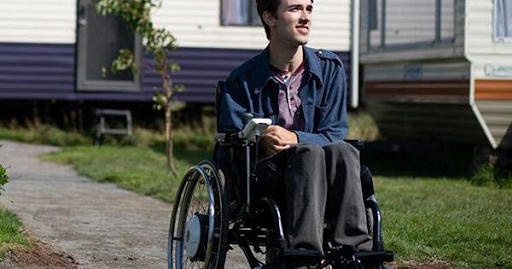Re-imagining Disabled Desires: The Case of Isaac from Sex Education
The words disability and desire are hardly ever used in the same sentence. While most able-bodied folks believe that People with Disabilities are too caught up moping over their “imperfections” to ever experience another emotion, many disabled folks like myself find their desire burdensome because it requires unending explanations and apologies. This intersection becomes more complicated when contextualized in terms of exploration of sex and intimacy. Convention relegates disability to the likelihood of asexuality which has been created and furthered by the epitomisation of able-bodied standards of beauty in popular media and culture. Issac Godwins’s portrayal on the British show Sex Education thus, appears almost revolutionary for its nuance. The character, in its essence, pushes us to re-conceptualize our understanding of disabled desires.

Isaac's Exploration
Issac, with his sarcastic smirk and quick wit, provides a refreshing take on disability. His chemistry with Maeve is palpable and the bond that develops between the two is genuinely endearing. In exploring Meave and Isaac’s relationship in such detail the show outwardly challenges notions that project disabled folks never find partners or only end up with people with disabilities. Thus, the veil of undesirability is lifted at once.
At the same time, even as Issac deletes Otis’ voicemail and is transformed into the “bad guy,” he is never villainized. Even in trying to explain himself to Maeve later on, he does not attribute his actions to him feeling afraid that she might choose Otis over him because he is disabled. Issac is insecure, like most men his age, but the show ensures that he is never pitied for his feelings.
Issac is a deeply complex and nuanced character. His portrayal takes away from the two-dimensional treatment of disabled characters. This subversion becomes apparent when the show explores Maeve
and Isaac’s tryst with intimacy. In the beginning, Maeve is curious and asks Issac if he can feel below his waist. He gently guides her as they explore each other’s bodies. The scene, far from being awkward, is engaging, pleasurable and erotic. The show is not a didactic take on disabled folk’s ability to be intimate, it merely shows audiences that sex is pleasurable and desirable for everybody, regardless of ability.
Issac’s relationship with Amy begins on a rather strange note when she assumes that his inclination towards art is a means to process his trauma. He quickly (and sardonically) corrects her and points out that being disabled does not mean he is unhappy. It is also during a conversation with Amy later in the season that he reveals another desire, to live independently and earn some money by way of a teaching degree. Amy and Issac’s relationship blossoms because they help each other find a purpose. Issac opens up to Amy about his life in foster care and the show connects his anger to his experience at foster care, which may or may not have been impacted by his disability, but does not stem from it. This is also true of his relationship with Maeve as both characters connect over tumultuous childhoods and bitter experiences with family growing up.
Conclusion
Over four seasons of Sex Education, I have laughed, smirked, raged and even harboured a secret crush on Issac Goodwin. His character is a telling representation of my experiences as a disabled student. My love for him stems from his ability to make me believe that all of us will have a happy ending one day.
Author

